289 Sports > Basketball > Harden gave everything he had but lost 9 of 10 games! What is the problem with this Clippers team?
Harden gave everything he had but lost 9 of 10 games! What is the problem with this Clippers team?
In the game against the Magic, the Clippers once again collapsed in three quarters and lost by 28 points. Harden once again scored 31 points and 8 assists. Since then, the Clippers have lost 9 of the past 10 games. So what are the Clippers' problems? This column will help you understand through in-depth data analysis.

The aging Harden has given everything he has. In the past 10 games, Harden has played in 9 games, averaging 29.1 points and 8.3 assists per game, with two shooting percentages reaching 42.8% and 40%. The last time he averaged 29 points per game dates back to his Rockets days, so the Clippers' current problems are not because of Harden, or at least not the main reason.
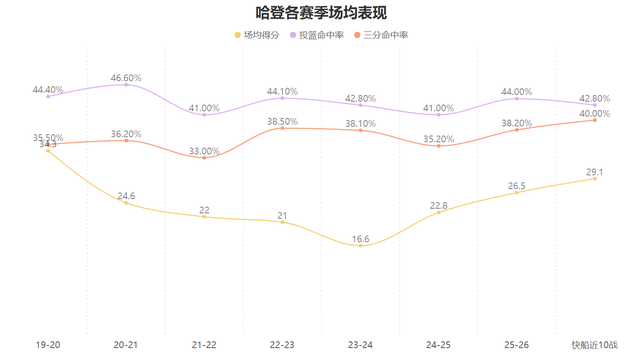
The Clippers' net efficiency this season is only minus 6.1, which means that they lose 6.1 points per 100 possessions to their opponents. They are ranked 25th among the 30 teams in the league and are absolutely at the lower level. With such a low net rating, it cannot be said that the Clippers are just unlucky and always lose. They really have various problems. So what are the main problems of the Clippers?
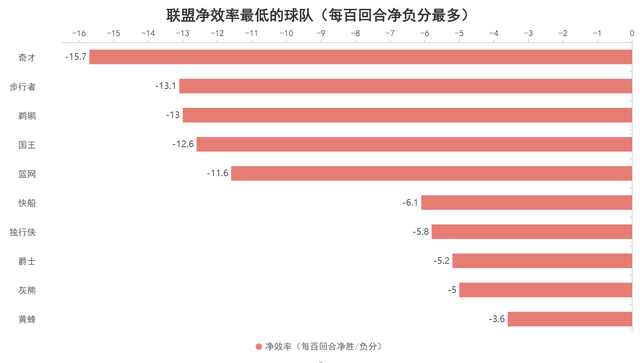
When the Clippers defended their opponents this season, their opponents' shooting percentage increased by 0.4% compared to the season average. The Clippers ranked 18th in the league in terms of their ability to reduce their opponents' shooting percentage. Although the reduction effect is not strong, it is not the worst team. This also means that if the Clippers can truly face their opponents' offense, their opponents will not get too many benefits.

But the problem is that many times the Clippers cannot really complete the defense. Take the game against the Magic. The Magic's offensive and defensive transition score reached an exaggerated 41 points, which is far more than the Clippers' 15 points. This means that a large number of the Magic's points are obtained through defensive counterattacks. In this case, the Clippers cannot truly complete the defensive positioning. This is also true this season. When the Clippers face their opponents, their opponents' offensive and defensive transition points per game have reached the league's second-highest 18.8 points.
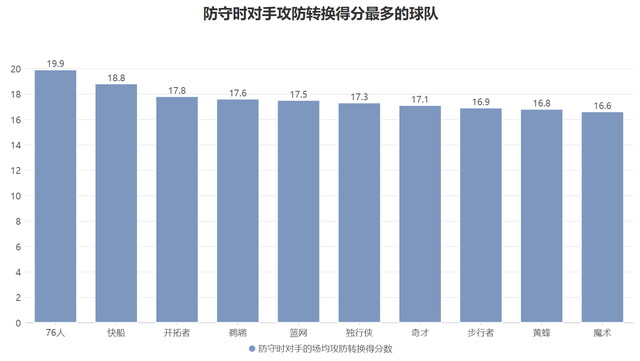
If it were just that, it wouldn’t be a big problem. After all, each team has different offensive and defensive rhythms. But what will happen to the Clippers lies in the structure of the lineup. The current Clippers basically have various flaws except for individual players: either they are very old, such as Paul Lobatum, or they are very young, such as Sanders Blanc. Risti's old speed and physical fitness do not allow them to run and jump faster. Young people lack experience and awareness and easily get into position without knowing what to do. In addition, except for Harden, they are generally not good at handling the ball. This results in the Clippers' average offensive and defensive transition points per game, which is only 11.7 points, which is the 29th highest in the league. In this alone, the Clippers average 7.1 points per game, which is the second-highest net negative score in the league.

At the same time, what is even more outrageous is that the Clippers' offensive and defensive rebound rates are also at the lower reaches of the league. This means that the Clippers' acquisition rate of both offensive rebounds and defensive rebounds is the lower team in the league. Why is this outrageous? As an old and young team, it is natural to make a choice: if you want to pursue the speed of defensive counterattack, you should launch the offense faster. Doing so will result in insufficient protection of backcourt rebounds and a lower defensive rebound rate; on the contrary, if you want to pursue the protection of backcourt rebounds, then the natural offense and defense transition speed will not be fast enough and the score will drop. However, the Clippers are now in a state where they can neither protect the backcourt rebounds nor make a stronger offense and defense transition.
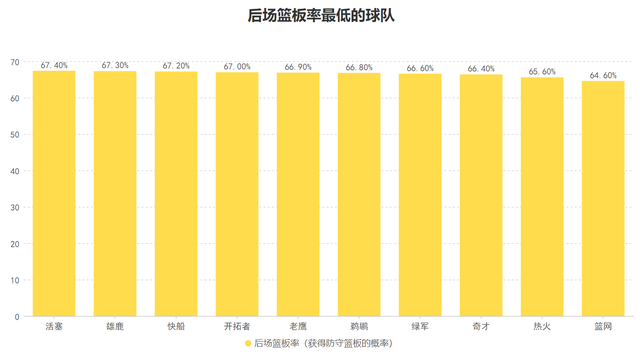
Similarly, if you want to pursue offensive rebounds, it will naturally lead to an increase in the opponent's offensive and defensive transition points. If you strategically give up rushing for offensive rebounds and choose to retreat, then your offensive rebounding rate will naturally decrease and your opponent will suffer. Scores in transition between offense and defense have also declined. Qualified teams such as the Rockets can choose to maximize offensive rebounds without losing too many points in transition between offense and defense. However, the Clippers are in a state where they can neither grab offensive rebounds nor retreat to limit the opponent's transition between offense and defense due to lineup flaws.
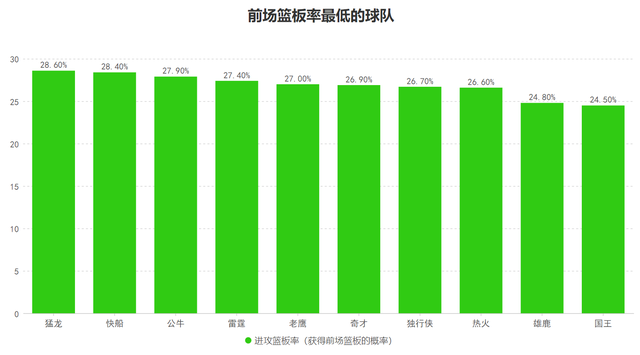
Overall, the Clippers have all the wrong answers in one. Of course, the shortcomings of the lineup cannot be solved immediately, but the Clippers should obviously make corresponding adjustments on which tactics to choose. Otherwise, this problem will not be solved just by Leonard's comeback.
source:7n cnRelated Posts
Is the No. 1 pick averaging 28+8 per game overvalued? After the absence, the team won 5 of 6 games! The 7-for-1 huge loss transaction also turned into a profit
BasketballOn November 23, the NBA regular season continued. In the just-concluded game, the Magic defeated the Knicks 133-121. Although the Knicks were missing Anunoby in this game, Brunson, Towns and Bridges all played. I thought they would have the last lau...
moreHarden gave everything he had but lost 9 of 10 games! What is the problem with this Clippers team?
BasketballIn the game against the Magic, the Clippers once again collapsed in three quarters and lost by 28 points. Harden once again scored 31 points and 8 assists. Since then, the Clippers have lost 9 of the past 10 games. So what are the Clippers' prob...
moreScored 20 points on 5-of-12 shooting! Garland: Playing alongside my teammates and winning is everything I look forward to.
BasketballIn the NBA Cup group match on November 22, the Cavaliers defeated the Pacers 120-109 at home. After the game, Garland was interviewed. Talking about his comeback, Garland said: It feels great to be able to return to my teammates, recommit to the cau...
more
Hot Posts
- With 5 consecutive victories in hand, the Rockets still have 3 gains to win. They have found Ethan as a substitute. One play style cannot become the norm.
- Suns coach: It’s never easy to limit Wenban. This is our best defensive performance this season.
- Dark horse! The Bulls officially revealed the first record in the Eastern Conference: We love 5-0, keep working hard
- Last season, averaged 9.7 points and 2.2 rebounds! Jersey Reporter: Coffey wore No. 17 jersey in the Bucks
- 18 years of the showdown in the league to looking up to the new king, the legend continues
- Durant himself never thought he could enjoy super high treatment in his life, but he came to the right place!
- The park championship has no value? American News: The Lakers have better psychological adjustment and beat many stars all the way
- As strong as Jokic is only the No. 41 pick in the second round in 2014. Who are the top five in the same class? Tanhua became an MVP
- Well-known reporter: The Lakers center may get a contract of 5.2 million, but he may still stay with the Lakers
- The logo of the NBA tough guy: Kobe s Achilles tendon, Rose s knees, Green s heart
Recent Posts
-
The tiebreak has not started yet, 4 bad news comes from the Nuggets, Gordon is diagnosed, Westbrook s dream of winning is shattered again
-
Actor Tiancha and Jenna sisters watch the game, changing seats in midfield & the Knicks with hats start to lead
-
The personal ability is indeed excellent, but the Pacers wings still have some incompatible with others?
-
[Old General Record] The Trailblazer Hero with Seven Surgeries!
-
Celtics Rumors: Boston s Real Feelings on Derek White s Offseason Trading Negotiations
-
Average of 6 points + 5 points! The two players who should trade the Thunder, with an annual salary of tens of millions, will also mislead the general public
-
2.26 meters has become the first altitude in football! Former 40-year-old NBA star Podkorkin competes in the Russian Cup
-
Free, refuse to renew your contract! The Clippers are the first to leave the team! Harden, the whole world has misunderstood you...
-
Caruso talks about Alexander s gift of Rolex: I don t even look at the watch, I just want to say thank you
-
Randle on The Tonight Show: Kobe Bryant gave me the motivation to swim with the sharks